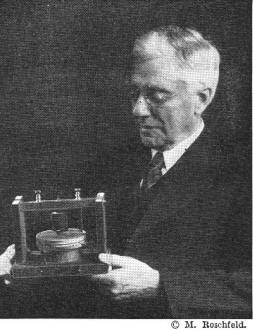Dr. Watson - Maker of First Telephone - Dies
|
|
Contained in this obituary honoring Alexander Graham Bell's assistant, Dr. Thomas A. Watson, which appeared in the March 1935 issue of Radio-Craft, is a bit of information about a serendipitous event that led to the invention of the telephone. I do not recall having heard of it. This is just one more reason why perusing historical material like these magazines is so important for keeping alive the details of the other world's momentous events. Many demonstrations have shown how as stories get passed on from person to person, generation to generation, some or all of the original details get lost or modified along the way until the contemporary version of the event barely represents the facts. Dr. Watson - Maker of First Telephone - Dies by M. Roschfeld. The late Dr. Watson with a replica of the first telephone.
Dr. Watson and Professor Bell became acquainted during the latter's early experiments. On the afternoon of June 2, 1875, the two men were working on Bell's "harmonic telegraph" when one of the transmitter strings stopped vibrating and Watson plucked it again, the plucking sound being carried over the wires to Bell, who then recognized the beginning of the telephone. "After having made the first telephone and put up the first telephone wire," Dr. Watson said in an interview, recently, "I also had the distinction of hearing the first words ['Mr. Watson, come here; I want you!'] ever spoken over the telephone." He retired in 1903 from active business but always retained his interest in telephony and in 1920 envisioned trans-Atlantic conversations as only the beginning of development in this method of communication. The importance of the telephone transmitter to the development of radio, especially radio broadcasting, can readily be appreciated by any radio technician.
Posted October 14, 2016 |
|

